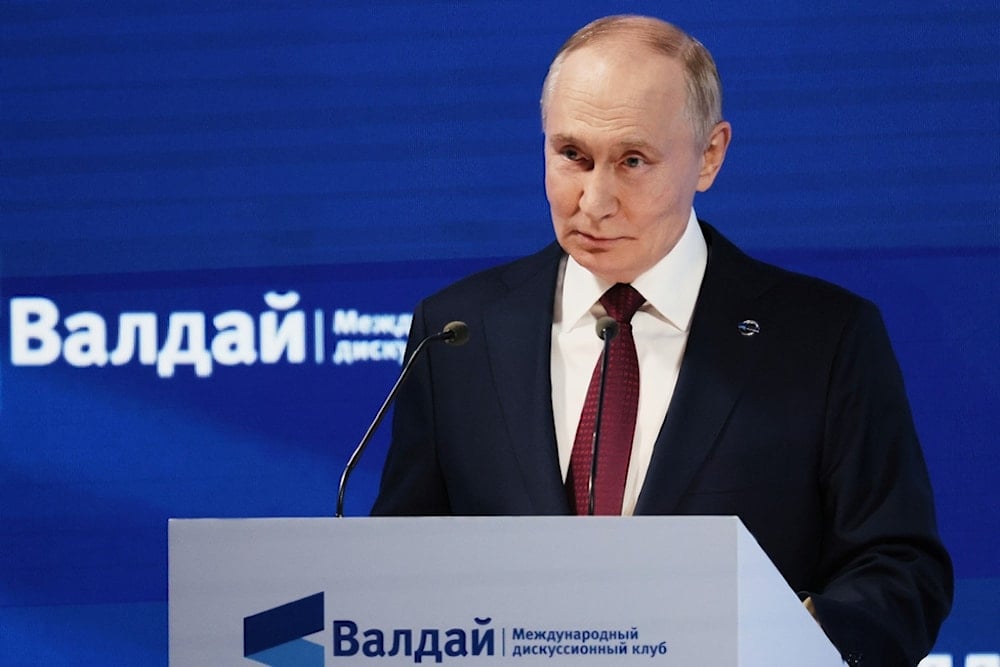Putin warns Europe on militarization, calls Gaza war a tragedy
At the Valdai Club, Putin warned of Europe’s militarization, accused NATO of waging war on Russia, and called the Gaza conflict a tragedy of modern history.
-

Russian President Vladimir Putin addresses a meeting with foreign policy experts at the Valdai Discussion Club in the Black Sea resort of Sochi, Russia, on Thursday, October 2, 2025 (AP)
Russian President Vladimir Putin delivered a wide-ranging speech at the 22nd annual meeting of the Valdai Discussion Club in Sochi on Thursday, addressing the conflict in Ukraine, the war in Gaza, and shifting global power dynamics.
Putin said Russia is closely monitoring what he described as the growing militarization of Europe, warning that Moscow’s response would be “very convincing.” He stressed that Russia had “never initiated any military confrontation,” insisting that speculation about Russian plans to attack NATO was “unbelievable.”
“All NATO countries are waging war against us,” he told participants, alleging that the alliance provides weapons, intelligence, and training to Ukraine through a special coordination center in Europe.
Criticism of Europe’s role in Ukraine
The Russian president argued that the conflict in Ukraine could have been avoided if NATO had not expanded toward Russia’s borders, adding that Western powers “consider Ukrainians expendable.”
Putin accused Brussels of “constantly escalating the conflict in Ukraine,” claiming Europe had no other strategic goal. He suggested that despite “brainwashing,” public opinion in Ukraine was shifting, and said he believed goodwill would eventually prevail.
He added that Europe, once admired globally, was “shrinking and fading away,” in contrast to the rise of other regions and partnerships.
Gaza crisis a “terrible event”
Turning to West Asia, Putin described the ongoing war in Gaza as “a terrible event in modern history.” He said Moscow supports aspects of US President Donald Trump’s proposed plan to end the conflict, particularly provisions for freeing hostages and releasing Palestinian prisoners.
The Russian leader reaffirmed his support for a two-state solution, saying: “Russia has always advocated the creation of two states, Israel and a Palestinian state… this is the key to a final solution to the Palestinian-Israeli conflict.”
Putin noted that Russia maintains contact with the Hamas movement and stressed that the Palestinian position must be taken into account. He added that Palestinian Authority President Mahmoud Abbas should play a leading role in Gaza’s future governance.
Rise of BRICS, SCO, and global “decolonization”
On the international stage, Putin argued that a “new wave of de facto decolonization” is gaining momentum worldwide, with former colonies asserting full political, economic, and cultural sovereignty.
He highlighted the rising influence of organizations such as BRICS and the Shanghai Cooperation Organization (SCO), contrasting their growth with what he described as the decline of Western-led institutions like the Organization for Security and Co-operation in Europe (OSCE).
“The authority of these organizations is growing,” Putin said, adding that SCO and BRICS members share the goal of finding “mutually acceptable solutions” in a multipolar world.
Putin also praised the Russian armed forces, calling them “the most combat-ready army today,” and emphasized that Moscow would never show “weakness or indecisiveness” in defending its sovereignty.
Kremlin warns of escalation
Russian officials warned that any US move to supply Tomahawk cruise missiles to Ukraine would represent a grave escalation of the ongoing conflict. The remarks came Thursday from Kremlin spokesman Dmitry Peskov, who said Moscow would interpret such a decision as a major provocation requiring a strong response.
"If this happens, it will be a new, serious escalation of tensions that will require an adequate response from Russia," Peskov told journalist Pavel Zarubin.
The Kremlin's warning follows recent US discussions about allowing Ukraine to conduct deeper strikes into Russian territory, a policy shift that Moscow says crosses a dangerous line. Peskov dismissed the notion that any advanced weaponry could alter the war's trajectory, insisting that Russia's military objectives would remain unchanged.
"There is no magic weapon for Kiev, and no weapon can radically change the course of events on the front line," he added.
Peskov also cautioned that certain US officials have hinted at approving long-range operations within Russian borders, a step he called "a rather dangerous symptom." He accused Western countries of being unwilling to address even the theoretical prospect of nuclear technology transfers to Ukraine, remarking, "The West is afraid to talk about the possibility of transferring nuclear technology to Kiev."

 4 Min Read
4 Min Read








